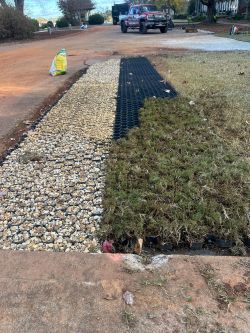

 |
| Photo 1 (by Rich Braman): A ground breaking ceremony was held at the demonstration site in November 2024, quite literally! |
 |
| Photo 2 (by Luis Moreno): A pervious grid system installed alongside driveway pavement will improve stormwater infiltration at the Research Gardens.The grid is on a bed of stone 12 inches deep and will display turfgrass and stone filled options that can both take the weight of inadvertent vehicle traffic. |